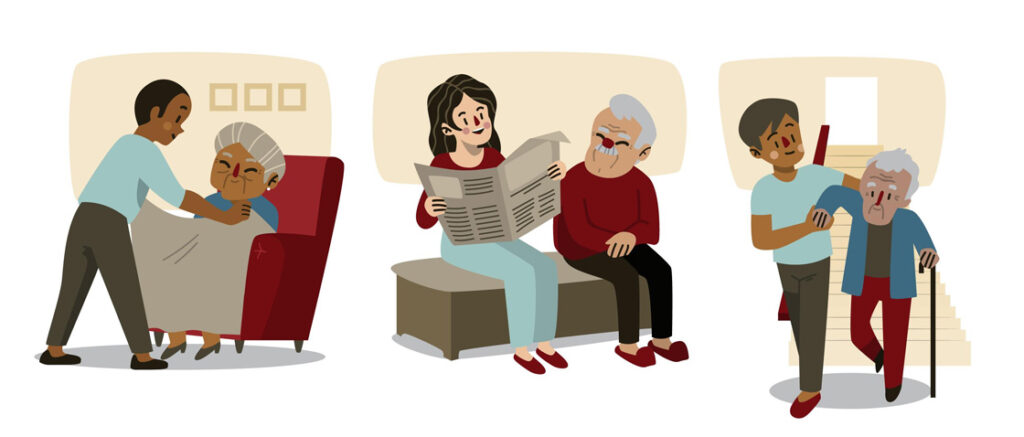Compassionate Companionship for a Happier Life
Enhancing social connections, emotional well-being, and daily support for seniors.
What is Companionship Care ?
Companionship care focuses on fostering social interaction, emotional support, and help with everyday activities. Our caregivers are more than just helpers; they’re trusted companions who ensure clients feel valued, connected, and empowered to maintain their independence.

Our Companionship Services

Conversation & Reminiscing
Engaging in meaningful discussions and sharing cherished memories.

Hobbies and Activities
Joining in with pastimes like gardening, puzzles, or arts and crafts.

Meal Preparation
Preparing and enjoying meals together to encourage good nutrition.

Light Housekeeping
Helping to keep your home tidy and comfortable.

Errands and Outings
Accompanying clients to medical appointments, shops, or community events.

Emotional Support
Offering reassurance, positivity, and a listening ear.
Enhanced Social Engagement
- Meaningful connections and friendships.
- Engaging in conversations and discussions.
- Emotional support and empathy.
- Fun and enjoyable social activities.
- Increased sense of belonging and community.
- Reduced feelings of loneliness and isolation.
- A supportive and caring environment

The Importance of Companionship in Aged Care
Mum or Dad stuck in a corner, no attention for anyone, no visitors — people form their own opinions about what aged care is like. But the reality is aged care providers are very aware of the benefits of social interaction for older adults in aged care and do a lot of different things to encourage it. What those things are and how they happen — we’re about to find out.
What loneliness means for seniors
Loneliness isn’t just an emotional issue. It’s not just something you ‘feel’. Loneliness is a problem that can affect every part of an older person’s life.
In fact, research has shown that loneliness can be as harmful as smoking up to 15 cigarettes per day.
How aged care can help
It’s no surprise that aged care providers take loneliness seriously: that’s where companionship comes in. No matter who you are, as an aged care resident, you deserve to have people that care about you and have programs designed to help you feel included.
- A friend knocking on your door to see if you're doing ok
- A staff member giving you a smile as they change out your towels and bedsheets
- Spending time in a walking group out getting some sun & vitamin D
- Or even playing a couple rounds of bridge in the games room.
There are literally hundreds of different people & programs that make an aged care home a community — not just a place to grow old in

Benefits of Social Interaction for Older Adults
Whether it’s in a group or one on one, there are many benefits to companionship and social interaction
Mental Stimulation
Engaging in conversations keeps the mind sharp and active.
Physical Health
Socially active seniors often have better cardiovascular health and immune responses.
Reduced Risk of Depression
Interaction combats feelings of isolation, a leading cause of depression in the elderly.
Longevity
Believe it or not, having a vibrant social life can actually extend one's lifespan!
How to Provide Companionship for Seniors in Aged Care
No aged care provider wants to see residents feeling lonely. We know better than anyone the negative effects that loneliness can have on people.
A study delved into older adults’ experiences with social participation in group physical activity programs. The findings revealed that the programs significantly increased social interaction, fostered relationships, and promoted a sense of belonging. But it’s not just groups that can have a positive impact.
There’s so many different kinds of activities in aged care and in fact, we would go as far as to say (even if it does sound cliche) there is literally something for everyone:
Intergenerational programs
Connect seniors with students for mutual learning and sharing, fostering meaningful relationships and valuable life lessons.
Pet Therapy
Dogs, cats, birds and sometimes even visits from farm animals & reptiles! The unconditional love of animals can be incredibly therapeutic.
Volunteer Programs
Encourage community members to spend time with seniors.
Technology
Facilitate video calls with family members or friends.
Gardening Clubs
Create a community garden where seniors can plant and nurture their favorite flowers or vegetables.
Cooking Classes
Organize sessions where they can learn new recipes or share their own.
Storytelling Sessions
Encourage seniors to share personal stories or write memoirs.
Art and Craft Workshops
Introduce activities like pottery, knitting, or painting.
DIY Workshops
Simple home projects like making birdhouses or decorating frames.
Music Therapy
Host sing-along sessions or invite local musicians for performances.
Dance Classes
From ballroom to chair dancing, get those feet moving!
Board Games & Bingo
Classics like chess or newer games can stimulate the mind.
Armchair Travel
Organize virtual tours of exotic destinations using VR technology.
Book Clubs
Discuss novels, biographies, or even create a senior’s book-writing club.
Photography Classes
Teach basics and organize photo walks within the facility.
Nature Walks
If possible, arrange for guided nature walks in nearby parks.
Puzzle Competitions
Sudoku, crosswords, or jigsaw puzzles can be both fun and mentally stimulating.